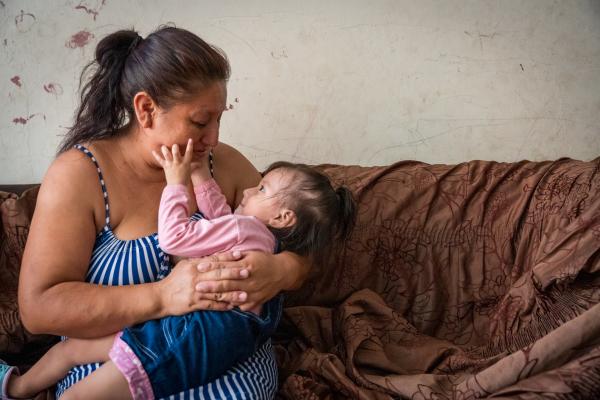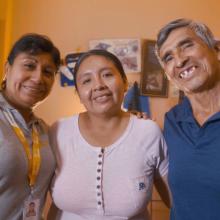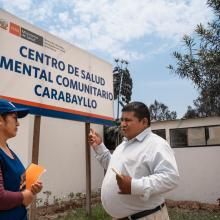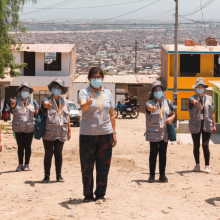Delia Bruno, 32, was in the last trimester of gestation of her first pregnancy when she went to the Juan Pablo II Health Center, located in the district of Carabayllo, north of Lima, in late 2023. Previously, she had gone to this facility for her prenatal checkup. But something about her was not right.
“I was feeling very bad, downright depressed,” she recalls. “When I would go in for my checkups, I would cry with sadness. I didn’t see life the way I see it now.”
Bruno’s symptoms were similar to those of almost 30% of pregnant women in Northern Lima, as identified by a study by the Mental Health Program (SAME) of Socios En Salud. The separation with the father of her daughter, marked by signs of infidelity, was difficult for her to assimilate. An onboard threat, moreover, did not allow her to see her pregnancy as “a special stage.”
It was then that her gynecologist introduced her to psychologist María Fernanda Amézquita, head of the Healthy Thinking Strategy (PENSA) of the SAME Program, who was visiting the Juan Pablo II Health Center that day.
“That’s when it all started. That’s when the call started,” Bruno says.
In January 2024, Partners In Health contacted her. Although she admits she was on the verge of not answering the call - she distrusts unknown numbers - she ended up picking up the phone. Today she is one of 80 women receiving care through PENSA this year, including free therapy and psychological support. Four months into the strategy, with her two-month-old baby in her arms, Bruno acknowledges that she has made improvements.
“Right now I feel not 100 percent well, but I feel good,” he says. “There are days when I relapse as there are days when I feel much better. Little by little you make progress.”
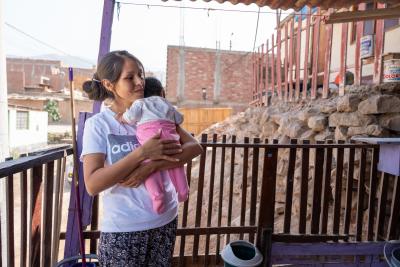
Delia Bruno sostiene a su pequeña bebé en los exteriores de su hogar en Carabayllo, Lima.
Foto de Diego Diaz / SES
The Active Search for Pregnant Women
Socios En Salud has worked in Peru for more than 25 years, with an initial response to a deadly outbreak of multidrug-resistant tuberculosis in Carabayllo. In the years since, it has expanded its programs to provide medical care and social support in a variety of clinical areas, including mental health.
Thus, in 2018, it implemented PENSA, a strategy recommended by the World Health Organization for pregnant women with depression. This initiative began in the community of Carabayllo and used materials developed by Atif Rahman, a child psychiatrist and clinical researcher at the University of Liverpool.
“We started the work with eight pregnant women and everything was face-to-face,” says Amézquita. “So far we have intervened with more than 500 pregnant women.”
The PENSA intervention is made up of 16 sessions, divided into modules, which focus on three essential areas: the mother’s health, the mother’s relationship with the baby and the mother’s relationship with the people around her.
“We try to reinforce these areas so that they can have emotional support in their families and develop a correct emotional bond with their sons or daughters, as well as with themselves,” Amézquita points out.
She also states that they are actively searching for “women who are undergoing pre- and post-natal check-ups at health centers and show symptoms of depression,” after obtaining permission from the Directorate of Integrated Health Networks of North Lima, of the Ministry of Health.
“We visit the health facilities, contact the pregnant women in person or by telephone and invite them to participate in an evaluation for depression with tests recommended by the Ministry of Health,” explains Amézquita.
This is how Socios En Salud developed the PENSA pilot. Even before the COVID-19 pandemic, it conducted its sessions with pregnant women and mothers via video calls, or by phone in case of internet coverage problems. When face-to-face activities resumed, so did home visits.
The strategy also considered each social determinant (identifying resources that families may need, such as vouchers for transportation, food and social support), which has been key to its overall success.
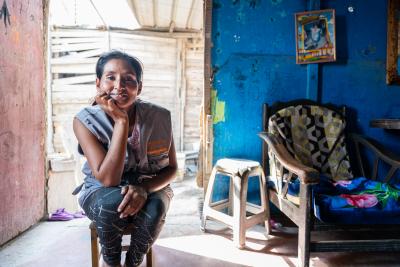
Susana Gamboa, una de las 22 agentes comunitarias capacitadas por el Programa de Salud Mental para la estrategia Pensamiento Saludable.
Foto de Diego Díaz / SES
Care from the community
Leidith Tinoco, 38, still recalls with gratitude the dedication shown to her by Susana Gamboa, the community agent that Socios En Salud assigned to her as part of her therapy at PENSA.
“La doctora (that’s what Tinoco calls Gamboa) has been looking out for me. I feel very grateful,” she says.
Community agents are local residents hired in the communities where Socios En Salud works and are trained to provide basic medical care, such as delivering medications, checking on patients at home or accompanying them to appointments. PENSA has 22 people dedicated to this work and trained in maternal mental health.
Tinoco was pregnant with her fourth child when she joined the PENSA strategy in April 2022. She had previously gone to the Centro Materno Infantil El Progreso, in Carabayllo, seeking psychological help, as she was going through family and economic problems, which caused her to experience negative thoughts about herself.
“There were times when I wanted to disappear, because sometimes I had problems with my husband, (while I was) pregnant (…) I was very distrustful,” she says.
Amézquita and the PENSA team had heard stories like this before. Scarcity of resources, couple breakups, lack of recognition at home, domestic violence and unwanted pregnancies are often the factors that contribute to depression in pregnant women. A difficult path in which they need constant accompaniment to continue their treatment.
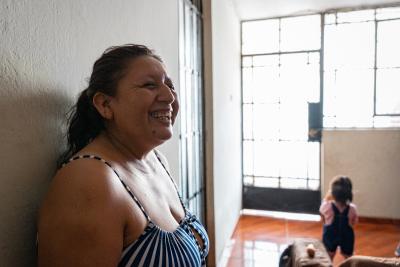
Leidith Tinoco se incorporó a Pensamiento Saludable en plena pandemia de COVID-19. Recibió tratamiento a través de videollamadas y destaca que la comunicación constante con el equipo de Socios En Salud fue clave para su recuperación.
Foto de Diego Díaz / SES
“When moms feel that you are by their side, that helps them more than anything. ‘You are not alone’ is the key phrase,” says Susana Gamboa, who was trained as a PENSA team community agent during the pandemic.
Tinoco attested that, throughout her therapy, Gamboa was always there to listen to her.
“Sometimes I would argue with my partner and call Dr. [Gamboa],” she says. “I would tell her I wanted to drop everything, but [Gamboa] gave me advice and I trusted her. We would talk with the [PENSA] manual in hand. All that helped me.”
On more than one occasion, Gamboa has helped convince mothers and pregnant women to continue therapy. Empathy and the PENSA manual, she says, are her best tools for dealing with the different cases she encounters. Also key is the ongoing supervision of PENSA psychologists, to whom the community agents report the progress of the women they see.
Amézquita says the women end up seeing the community agents “as their friends, their doctors, their psychologists.”
“We try to build a lot of trust between them to continue their follow-up until their child is one year old,” she stresses.
The family is also involved in the recovery process of these women. For Tinoco, having her husband take on household chores was crucial to continuing at PENSA, while, for Bruno, his father’s moral support proved significant. It is the sum of these efforts that helps mothers and mothers-to-be find a lighthouse in the storm.
If you would like to receive more information on our activities, you can subscribe here. Join our movement for health!
